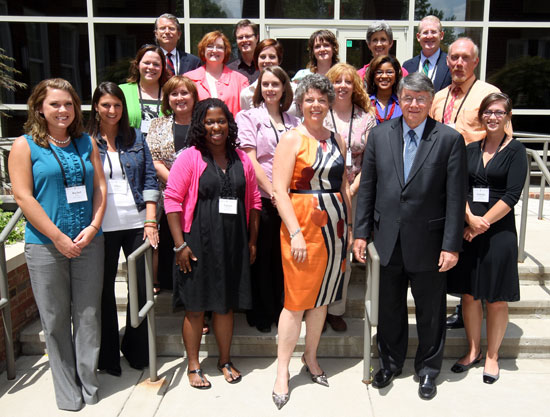Give to the Nashville Public Education Foundation and support the Teaching and Learning in Urban Schools program or other community agencies

With vital support from the Nashville Public Education Foundation, some Peabody College professional students are helping to build expertise in Nashville’s urban schools.
A partnership between top-ranked Peabody College of education and human development and Metropolitan Nashville Public Schools brings certified teachers who have a strong interest in improving urban education to designated Metro middle schools. Those admitted into the Vanderbilt Master’s Program in Teaching and Learning in Urban Schools enroll tuition-free, thanks to an agreement between Vanderbilt and Metro Schools that includes partial funding from the foundation.
Gifts can be made to this and other community agencies through Dec. 31, 2011.
Lindsey Nelson, who taught in Charlotte, N.C., schools for five years, is among almost a dozen Peabody professional students who now work at Apollo Middle School.
“I knew that I wanted to focus on urban education and that this was the right program for me,” said Nelson, who teaches sixth-grade language arts and social studies. “[rquote]What has been especially great is having a tight-knit group of colleagues who are teaching at the same school and then taking classes together at Peabody. We truly learn and grow together in our shared experience.”[/rquote]
One of the unique aspects of the program is the in-school classroom coaching provided by Peabody faculty, according to Lanette Waddell, an assistant professor of the practice of mathematics education and director of the master’s program.
“We want our graduates to become innovative leaders of best practices in urban schools. One way we do this is by providing a setting to discuss classroom instruction and giving feedback,” Waddell said.
She noted that Metro Schools, through Director of Schools Jesse Register, approached Vanderbilt about developing the program, which has very focused goals for improving teaching effectiveness and student outcomes. Currently, there are opportunities to teach mathematics, science and literacy in three urban middle schools. Participants must commit to teaching in Metro classrooms for five years. Employment with Metro Schools is a condition of admittance to the master’s program.
 While many days extend into evening classes for the Peabody students, Nelson believes the program is definitely worth it.
While many days extend into evening classes for the Peabody students, Nelson believes the program is definitely worth it.
“The level of rigor and expectations of the faculty is outstanding,” she said. “I have learned more during the past five months than I did during five years of previous teaching. In addition, we receive strong support from Apollo’s principal, Jon Hubble, and are pushed to success from every angle.”
The Nashville Public Education Foundation, formerly known as the Nashville Alliance for Public Education, was established in 2003 to develop and support programs such as Teaching and Learning in Urban Public Schools that build broader and deeper community engagement in public education. Thanks to the vision of the late Nelson Andrews, a longtime member of the Vanderbilt Board of Trust and a civic leader, the organization has been instrumental in engaging community ownership of Nashville’s public schools.
“The Nashville Public Education Foundation supports important programs in partnership with Vanderbilt University, Vanderbilt University Medical Center and Metro Nashville Public Schools,” said Katie Welsh, foundation staff member.